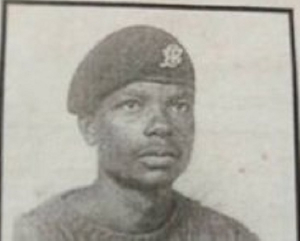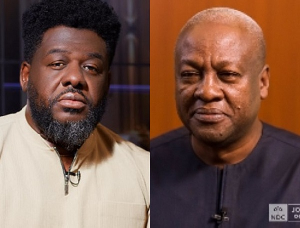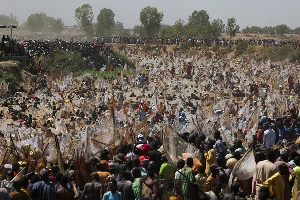Asante Fordjour LLB(Hons), LLM International Law And Criminal Justice
ABSTRACT
Social theorist Morris Rosenberg once pointed out that there is some sort of human currency to be measured and this currency, value, or rate, is actually measured by the person. These established tests and appraisals permit both criminal and social psychologists to measure self-esteem or self-consciousness of the human and in our present hearing, the Ghana Police Service. Thus a person with high confidence, might project an image of a person that is much better than what they really are, and the confidence makes up for the difference. The focus of Ghana Police as it now puts, is on forming strategic partnership with the public in the fight against crime. To achieve this community policing, is now being encouraged in identifying potential crime problems and together with the Service map out strategies to check them. The Service prides itself of manpower strength of about 23,000. Yet it seems to JucticeGhana.com/OmanbaPa Research Group that image, crucial in contemporary state policing, is its greatest enemy.
INTRODUCTION
State policing indeed requires the collective efforts of every citizen. Yet conservatively argued, and in the context of constitutional rule, it is neither the members of Bureau of National Investigations (BNI) nor the armed forces but the police, who could stop, question, arrest, detain and charge any person for any criminal offence. Are you therefore, not puzzled over the legal basis of the meddling of bni-cum-military in the process of arrest and detention in Ghana? To resolve this issue, perhaps we might need a bit of history to explain the usurpation of this customary police powers and authority.
Ghana Police Service: Brief History
The Ghana Police Force writes on its website that the professional policing that we see in Ghana today was introduced by the British Colonial Authorities to the Gold Coast in 1821. Before then, maintenance of law and order as the Service put it, was organized by traditional authorities such as the local headsmen and chiefs (the so-called asafo/ahenfie police), who employed unpaid messengers to carry out the executive and judicial functions in their respective communities. But with the institutionalization and formalization of police and the passing of the Police Ordinance in 1894, legal authority for the formation of a civil police force arose. Ever since, Gold Coast Police and its British counterparts have undergone a lot of introspections in the context of the remit of their respective traditions and history. Understandably, human development that comes as a result of educational training and personal adventurism and self-consciousness, have changed the faces and dimensions of the world and yes, how people behave and (re)act.
From the archives of Ghana Police, the Africanization of the police which in 1958, poled Mr. E. R. T. Madjitey as the first Ghanaian Police Commissioner, goes as far back to 1952, where a large number of Africans were enlisted into the Police Force as junior officers. This included the women branch of the service which became responsible for Juvenile crimes and offences committed by women. Today, the Service renders other important services such as (1) Motor Traffic duties to ensure safety on our roads; (2) Vetting and issuance of Police Criminal check certificates; and (3) Assisting and helping the female gender to deal with what it describes as traumatic and psychological problems of sexual abuse (usually against minors) as well as maintenance of law and order during elections.
In 1902, the Service, was split into General, Escort, Mines and Railway Police, and was legalized by the Police [Amendment] Ordinance of 1904. The Marine Police was formed in 1916 but disbanded in 1942 and replaced by Customs Excise and Preventive Service. The formation of Criminal Investigation Department [CID] in 1921 became operational in 1922 with the finger print section. And by 1948, the Police Reserves Unit has come into existence and with the mandate to combat riotous mobs, following the 1948 riots. In an effort to step up rapid and effective communication links within the colonies, the wireless and Communications Unit was established in 1950 with the formal opening of the Police Information Room in Accra by Governor Sir Charles Noble Arden Clark, in June 1950. By virtue of Article 200(3) of the 1992 Constitution, today, the Police Service must be equipped and maintained to perform its customary role but in whose image and orders?
Ghana Police Service: The Image Question
Section 1 of the Police Force Act, 1970 (Act 350), states among others that: “It shall be the duties of the Police Force to prevent and detect crime, to apprehend offenders and to maintain public order and safety of persons and properties”. Yet a visit to its developing website offers little guidance on its Codes of Practice. Apart from its stated primary functions as set out in the cited Act, the citizen is at large as to how these duties are to be carried out. Hence one is misled in perceiving the Service as colonially-fashioned and perhaps at pains in the reconstruction of its crowned “bully poster” of 24 February 1966. Thus since that coup the service continue to suffer not only what seems to many as irreparable “low-esteem” to the armed forces but also, doubt whether it is really an honest partner for a safer Ghana. We might look through this with different political spectacles but we may agree that we would be bargain at price that we tag on ourselves.
In the context of Ghana, one might argue that the Africanization of the Service in the latter part of 1950 and indeed at Ghana’s self-rule came with a soaring socio-political cost. This is in reference to contentious issues surrounding what the Service describes as the ongoing joint operations with its traditional pal- the armed forces in clamping down the said increasing rate of armed robbery that seems to have engulfed the country and which in the words of the police, has yielded tremendous success which cannot be over emphasised? Indeed JusticeGhana concedes that arrest and detention could be effected by every citizen where there is obvious necessity to believe that crime is being or about to be committed. So for example, the Immigration and Preventive Officer at the airports as well as the Prison Officer at our various prisons, depending on the circumstances, can also invoke these powers. But there are reasonable qualifications to this Victorian norm- here where it can be shown that it is impracticable for the police to be called to its duty?
The Police Power and Process of Arrest
In the Kingdom of Great Britain, there is general police power to stop and search a person without arresting him. This is provided for in Police and Criminal Evidence Act 1984 (PACE) ss.1-7. The power can be exercised if a police officer has a “reasonable suspicion” that “a stolen or prohibited article” may be found on the suspected person(s). Although Plowden(2008) explains that arrest is without a definition and will often occur with a constable touching the person, the rule in Christie v Leachinsky (1947) AC 573 (UK) states that it is “the beginning of imprisonment”. Arrest could also be initiated either by the citizen or through the issuance of an arrest warrant. Arrest warrant is an official document that has been signed by an officer of the court ordering the arrest and detention of a named individual. But because arrest and detention impose restrictions on our personal liberties, it is said that no matter how grievous our crimes, the arresting officer ought to make it clear to us either by words or actions that we are not free to go.
Due to what Plowden describes as continuing issues with disproportionate use of stop and search powers on members of minority ethnic groups, the Code stresses that the action of the police must not be exercised in discriminatory manner. PACE Code A sets out how these powers should be exercised. In the spirit and letter of the law, the powers to stop and search must be used fairly, responsibly, with respect for people being searched and without unlawful discrimination. The Race Relations Act (Amended) Act 2000 makes it unlawful for police officer to discriminate on the grounds of race, colour, ethnic origin, nationality or national origins when using their powers, Code A, para 1.1.
The court has held that the use of the power must be fully justified and officers exercising the power should consider if the necessary objectives can be met by other, less intrusive means. Thus arrest must never be used simply because it can be used. In the Plowden’s explanation is that absence of justification for exercising the powers of arrest may lead to challenges should the case proceed to court. It is said that “When the power of arrest is exercised it is essential that it is exercised in a non-discriminatory and proportionate manner.” The Police Code G, para 1.2 and 1.3 go on to emphasise that ultimately it will be a matter for the “operational discretion of individual officers” whether a particular necessity condition is made out. Thus it is suggested that as Code G notes, it is likely that there will be an increase in the number of arguments at court as to whether an arresting police officer could have reasonably believed that it was necessary to arrest.
But in Fiak (2005) EWCA Crim 2381, the Court of Appeal held that arrest was a process, not a single event, and that it should not be “artificially compartmentalised” but could be postponed. Here Fiak was seen by the police sitting in the driving seat of a stationary BMW, throwing up into the gutter. When the police spoke to him he smelt of alcohol and was unsteady on his feet. The police suspected that he was drunk in charge of a motor vehicle. Fiak told the police that he was only sitting in the car and had left his house nearby for a few minutes to cool off after a row. On this basis the suspecting police officer told him to wait while she went to confirm his story. Knowing he was lying, Fiak refused to wait as instructed and tried to force his way into his house. At this point, a struggle ensued and was charged with criminal damage to his police cell. He argued that his original arrest had been unlawful because he had not been arrested by the officer before she went to confirm his story so he was acting lawfully in entering his own home.
This decision is said to be difficult to reconcile with authority- and that it might be better to follow the court’s alternative rationale-namely that the arrest was arguably completed at the point when Fiak was told to wait in his car, even though the word “arrest” was not used. Here in UK, PACE s.1(2) permits a constable to search any person or vehicle or anything in or on a vehicle for “stolen or prohibited articles”. The list of prohibited article” included: (a) Offensive weapons (b) Bladed instruments (as prohibited by s.139 Criminal Justice Act 1988) (c) Articles made or adapted for use in dishonesty offences (ie. theft burglary, taking a motor vehicle without consent) and (d) Articles made, adopted or intended for use in an offence of criminal damage (eg. Spray paint, etching tool). A caution should be given as soon as there are “reasonable grounds” to suspect a person of an offence: James [1996] Crim L R 650. It is incumbent on the police to inform the suspect reasons for his arrest and warn him about his answers to police questions.
The Police Caution on Arrest
A caution is a warning to a person that what they say or do not say may now have legal consequences. The terms of caution are laid down by PACE Code C para 10. “You do not have to say anything but it may harm your defence if you do not mention, when questioned, something which you later rely on in court. Anything you do say may be given in evidence. Do you understand?” Failure to state facts that are later relied upon in court can have adverse inferences. This strikes the balance between our legal rights to silence and/or civic obligation to give factual answers to police questions that might dilute their subjective “reasonable grounds” to suspect and arrest us of an offence.
In the words of Plowden, the objective basis for that suspicion must be based on facts- information and /or intelligence which are relevant to the circumstance and can never be supported on the basis of personal factors alone without reliable supporting intelligence… or some specific behaviour by the person concerned. Reasonable suspicion cannot be based on political generalisation or stereotyped images of certain groups or categories of people- person’s race, age or appearance, as more likely to be involved in criminal activity. Thus the fact that Kwame Asante is known to have previous conviction of stealing cassava or hen, cannot be used alone in/or in combination with each other as the reason for searching him. Arguably, the ruling in O’Hara v. Chief Constable RUC [1977] Crim LR 432 seems to give different limbs to “unreasonable generalisation test”.
Here the House of Lords held that the test fell in two parts first, there must be actual suspicion on the part of the arresting officer; secondly, there must be reasonable grounds (judged objectively, rather than subjectively) for that suspicion. It was not enough simply to say that the officer was acting on instruction from his superior; he must show “reasonable grounds for suspicion”. Thus, here the officer formed a genuine suspicion as the result of the briefing from his superior, and that that suspicion was reasonable. Accordingly, the O’Hara, arrested on suspicion of being a terrorist but later released on grounds of lack of evidence, could not win his claim against the police. This legal reasoning was also approved by the European Court of Human Rights as lawful: O’Hara v. United Kingdom, (2002) 34 E.H.R.R. 32. The legal analogy is that although Sections 44-47 UK Terrorism Act 2000 bestow on the UK Police a wide ranging power to stop and search any citizen without reasonable suspicion; the green light ought to be signalled by a senior officer- in this case of assistant chief constable rank or more senior.
What JusticeGhana.com attempts to convey here is that while modern state policing sometimes relies on rumours and murmurs, it ought to be linked to accurate and current intelligence if effective, legitimate and secure public confidence and collaboration were to be restored. Thus the obiter, it appears, is that if the Prosecution were to secure a reputable charge and conviction, the arresting officer must form genuine opinion which must be backed by yes, reliable intelligence and protocol beefed by superior authority. In O’Hara, had this not been the case, the scale would have probably swayed against the State. It might not be an exaggeration to say that even today; about 99 per cent of the Ghanaian population still believe that the Police/BNI can stop, search and arrest, detain, charge and arrange you before court at its whims even if the crucial evidence is missing.
The Ghana Police Service cannot travel on this path if it were to be able to combat both domestic and the emerging transnational crimes such as money laundering, human and drug trafficking as well as terrorism and sex-slavery. A compelling area that JusticeGhana had expected the BNI with all its seemingly human resource and overriding statutory authority over other security services, to have been at the forefront in Sate’s intelligence gathering and projections. But not electioneering predictions, car clamping and immigration controls which are well within the reach of the police and the Customs and Preventive Service. Yet the omnipresent Bureau appears to have lost face and faith with the Ghanaian and ultimately, helpless and arguably, frustrated because of its political origins. Yes, JusticeGhana.com has no scientific proof but it seems to us that if there is any pitfall in Ghana’s criminal justice system, then it is the shared power of arrest and detention of the Police and BNI whose statutory clarification, is long overdue.
JusticeGhana’s contributing advice is that for Ghana Police to restore its struggling image and be proactive in its intelligence gathering and analysis crucial for its role, it needs the collective efforts and trust of all but not the designed coercion and oppression associated with warring armies who had sought victories through infliction of psychological threats and pain- either by showcasing their degraded captives or abusing women and children in a manner inconsistent with rule of law which history, had shown all to be simplistic.
Email: theomanbaparesearchgroup@justiceghana.com
Credit JusticeGhana.com/The OmanbaPa Research Group
Opinions of Thursday, 10 December 2009
Columnist: JusticeGhana














